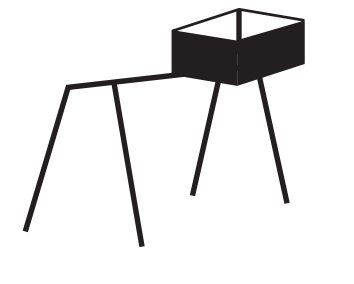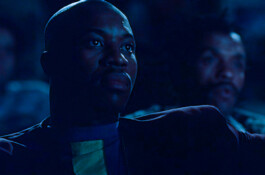






















































































1989, the Commission for Classification of Cinematography organizes a networking event for Ousmane Sembene's latest film Camp de Thiaroye. What starts with the best of intentions culminates in a court case of vital importance. An absurd ahistorical treatment of the censorship of a milestone in African cinema, where uncomfortable truths are confronted and heads roll.
Director’s note - Bibie/Benjamin Deboosere
The first time I saw Camp de Thiaroye (1988, O. Sembene/T. Faty Sow), in 2019, I was overwhelmed by the sense of historical injustice it makes palpable. The French war crime it depicts was unknown to me until that moment. Although the film was made by perhaps the most famous African film director at the height of his career, I had never heard of it before. Camp de Thiaroye tells the story of West African soldiers who fought for the French army against the Germans in World War II. Upon their return in 1944, instead of being lauded for their service, their wages are cut in half. When they protest, they are shot. Following in the footsteps of Aimé Césaire and Hannah Arendt, director Sembene makes the direct comparison between (French) colonial rule and Nazi Germany. At the time, I was working on my debut film, an anti-colonial reimagining of Robinson Crusoe (The life and strange surprising adventures of Robinson Crusoe who lived for twenty and eight years all alone on an inhabited island and said it was his (2023)). Seeing Camp de Thiaroye got me further thinking about how my view of the world was shaped while growing up in Western Europe. While I was reading a pro-colonial story like Robinson Crusoe as a kid (a white hero c`ivilising' indigenous inhabitants of an island, and claiming the territory as his own property), I did not have access to a film like Camp de Thiaroye. After watching the film, I searched online for information and quickly stumbled upon rumors of censorship. The film had apparently been banned for over ten years in France. I was angry, felt that something had been kept from me, that I had been lied to. The story of this censorship stayed with me in the years that followed. I decided to write this film about it. Naturally, both Robinson Crusoe and Camp de Thiaroye represent a much larger body of media production and censorship within the Western society I was raised.
“Colonialism always kills twice” is my guiding principle for this project. It is a quote from Sembene; first people are oppressed and murdered, then the memory of this oppression and murder is erased. My film imagines in an absurd way how the censorship commission gathers in a country house in France to supposedly facilitate the distribution of Camp de Thiaroye and therefore invite, Ousmane Sembene. Whereas many (contemporary) films do their best to come across as faithful as possible or at least keep up the appearance of doing so, with this film I'm not interested in a realistic reconstruction of the (French) censorship of Camp de Thiaroye. Rather, I want to explore the irrational, the imaginative, inspired by in-depth research into the case. I'd like to question this framework of `historical realism', which is actually based on a partial, Eurocentric perspective.
Genre: Narrative Fiction
Language: French
Production: Untitled Production, Hilife Cinematography, Twenty Nine Studio
Script & Direction: Benjamin Deboosere
Director of Photography: Hans Bruch Jr. SBC
Location of production: Belgium
Supported by VAF Fiction & Tax shelter of the Belgian government
in pre-production